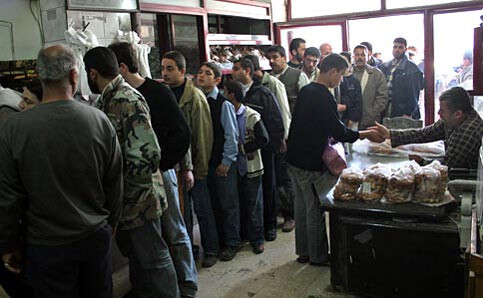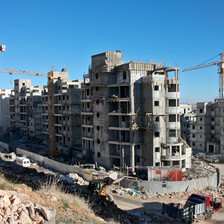The Electronic Intifada 30 March 2006
With an increasingly deteriorating situation on the ground, severe food shortages in Gaza, and talk of suspending aid to the Palestinian people, the Electronic Intifada asked Makboula Yasin, Executive Director of the United Palestinian Appeal, Inc., in Washington, D.C., what people can do in terms of getting direct humanitarian assistance to the people who need it most.
The Electronic Intifada: How is the situation on the ground in Palestine compared to a few years ago?
Makboula Yasin, UPA: Palestinians are in dire need of humanitarian aid, in light of the reactions of the international community to the past Palestinian elections with threats to cease aid to Palestine. As a result, the unstable economy will fall even more than it has been, as unemployment and poverty rise drastically. Palestine is already reeling from high unemployment and a poverty rate of 48%, with half its people surviving on food aid.

Palestinians wait to buy bread from a bakery in Gaza City, March 19, 2006. Dozens of Palestinians lined up outside bakeries today to buy bread as bakery owners complained they were running out of flour due to continued Israeli closure of the only viable commercial crossing with the Gaza Strip. (MaanImages/Wesam Saleh)
The Electronic Intifada: What are UPA’s priorities in the current period?
Makboula Yasin, UPA: With threats to eliminate international aid, UPA is attempting to address the immediate needs of people in the forms of food and medical aid. UPA is currently arranging for a large shipment of food items to Gaza as soon as possible. Additionally, UPA is working on a Vocational training and education program in Gaza. These besides UPA’s ongoing programs, such as Child sponsorship and Scholarship, see UPA’s website at www.helpupa.com for details.
The Electronic Intifada: How does UPA ensure that its aid gets to the people who need it most?
Makboula Yasin, UPA: UPA was established in 1978 in New York by Palestinian-Americans from the business and professional communities who shared the objective of creating an efficient and professionally managed charity that would assist needy Palestinians and contribute to socioeconomic and cultural development in Palestine. Over 95% of UPA’s overall revenue goes towards supporting UPA’s programs; and ensures consistently low administrative and fundraising expenses, specifically 3.5% fundraising and 1.4% administrative, as a result UPA received a four star rating on Charity Navigator. UPA has also received a Best Charities of American Seal of Approval through the Independent Charities of America, as well as, having been audited and approved by the Better Business Bureau’s Wise Giving Alliance for accountability, among other qualifications for charities. Additionally, UPA receives contributions through the Combined Federal Campaign and United Way, acquired through annual audits, as well. UPA works closely, as a team, with local NGO’s in Palestine to ensure quick and efficient delivery of services.
The Electronic Intifada: How can people help UPA to help Palestinians?
Makboula Yasin, UPA: Either donate by check, money order, wire, or through their company’s Matching Gift program. They can also contribute through the Combined Federal Campaign if they are federal employees (UPA is listed as #1451). See UPA’s website for ways to contribute. Fundraising efforts will help tremendously as the cost of shipping food can be $100,000 and up. They can help by spread the word about UPA, its mission, and its work to their family and friends.
Related Links
Established in 1978, United Palestinian Appeal, Inc. (UPA) is dedicated to providing aid to Palestinians in need, especially children, in the West Bank, the Gaza Strip, and Palestinian refugee camps in Lebanon. UPA provides both emergency humanitarian relief and long-term development programs to Palestinian communities striving for economic and social development in the wake of ongoing conflict.


